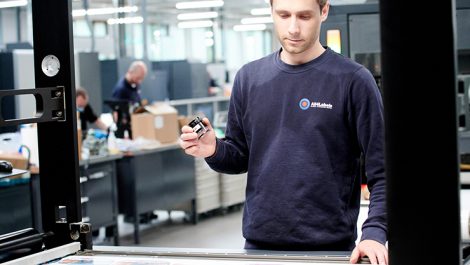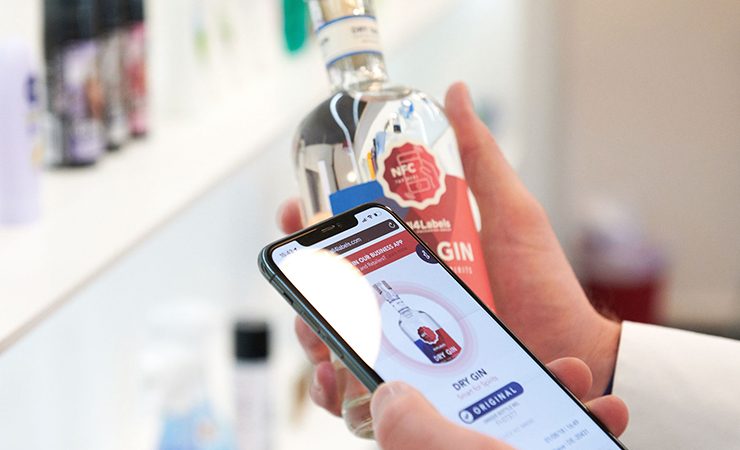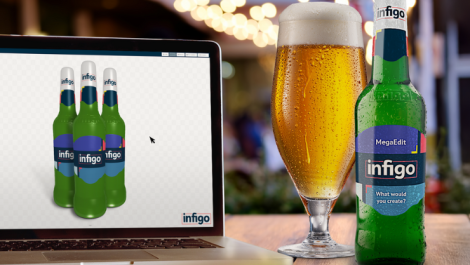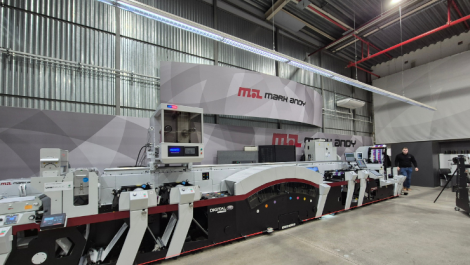Having been involved in the creation of one of the biggest global label and package printing groups in recent times, All4Labels, Roger Gehrke has seen and experienced a lot of changes over the last couple of years. To this day, he is guided by the proverb, ‘The best time to plant a tree was 20 years ago. The second-best time is now.’

Roger Gehrke is guided by the proverb, ‘The best time to plant a tree was 20 years ago. The second-best time is now.’
What is your current role and what are your main responsibilities?
Currently I’m the plant manager of our biggest digital label printing plant in Hamburg, Germany. My main responsibility is to run the site according to All4Labels’ standards in safety, performance and customer centricity. The plant itself is our digital innovation centre focusing on testing new equipment and tools together with our strategic suppliers. Me and my great team of digital printing enthusiasts believe in the power of technology supporting All4Labels’ innovation and growth strategy.
In my second role, I’m strongly involved in our group-wide technology activities, and helping to grow and maintain our digital leadership and to outline our innovation strategy. As a member of several advisory councils run by our strategic industry partners, I’m helping them to steer their research and development activities.
What are All4Labels’ growth objectives and ambitions?
With over 100 years of experience in exploring opportunities, we look back on a history of continuous growth. All4Labels is one of the world’s leading label and speciality packaging companies as well as a pioneer and leader in digital printing solutions. As a strong partner through a global network of 29 production sites and more than 3000 employees, we focus on the key growth areas and needs of our customers.
Our growth objectives are reflected in our long-term strategy, which envisages solutions for the future and anticipates industry needs.
This strategy includes growth of our digitisation strength, a key focus on sustainability, an expansion of our cross-functional approach and a continuation of organic and acquisitive growth worldwide.
What are the company’s main types of printed output?
Our product portfolio extends beyond pressure-sensitive, wet glue and in-mould labels to sleeves, tubes, flexible packaging and specialties like RFID, NFC, and other security and logistics related technologies, leveraging our expertise to offer the most suitable products and services to our customers. We offer a vast variety of packaging solutions manufactured in the highest quality and a great number of printing and finishing technologies to realise tailormade product solutions.
Extremely versatile and customer-centric, we aim to find the ideal product application relevant to the sector and the utilisation in order to increase our customers’ brand visibility and highlight their product features.
How long has this involved digital printing?
Back in 1997 the company started its digital printing journey with the purchase of an Indigo Omnius 50 digital label press, being one of the first companies in Europe to run this unit. When I took over the responsibility for this part of the company right before drupa 2008, I counted five digital printing presses. Today the group is operating almost 60 and we are committed to further develop this technology.
We have invested the necessary time and resources in digital printing, which makes us now the experts in this market segment. No doubt that the early years have been challenging but never discouraging, and our learning curve has been steep. This also sums up my personal experience during that time. In the first years, the benefits of this technology were immediately clear to me and I learned very quick as it became my technological passion.
And yes, without doubt in the beginning there was a certain scepticism in the company, and it was a challenge to convince some of my colleagues. Today, the technology is at least a mature and key asset of All4Labels. As a true believer in the technology this is for sure a well-earned compensation I have been working hard for during the past decade.
So how important is digital printing to All4Labels now?
It’s impossible to imagine our daily business without it. The USPs of digital printing are helping us every day to get the jobs done as requested by our customers. Looking especially at our small- to medium-sized customers, digital printing is a no-brainer. The technology enables us to deliver short runs in a decent timeframe, allowing the highest flexibility while assuring minimum waste of time and material. Also the multinational customers trust the technology. All major brand owners today are buying digitally printed packaging from our company. Today we are running centralised print shops as well as near-site wall-to-wall production close to the customers premises.

Despite early scepticism, digital is now an integral part of All4Labels’ production mix
Which digital printing technologies are in use?
Today, most of the digital printing equipment is using toner-based technology. We use this technology for most of our market segments. The versatility of the technology makes it suitable for a wide variety of applications from labels to flexible packaging to sleeves. In the last couple of years, inkjet and hybrid printing technology has become more and more important to support all the segments and portfolios where toner technology is having some limitations. It’s pretty much what we also see in the world of conventional printing. There is no one-size-fits- all solution, it’s always a combination to get the best of two or more worlds to be able to provide the full offering to our customers.
How have you witnessed digital printing develop?
In retrospect, digital printing becoming a mature technology took longer than many have expected, including myself. A bumpy start is only part of the full picture; there were a lot of constraints, with the printing industry well-known for its conservative approach making it hard for new technologies to gain traction.
In the end, progress is market driven. The need for individualisation of packaging, for SKU proliferation and short runs, paired with high flexibility requirements, is only achievable using digital printing. In a time where speed, service and quality are important business factors, digital is the inevitable answer for our industry. And it has only just begun.
What lessons have you learnt?
Where to start? I thought it would be easier to get the foot in the door. It was, and still is, a challenge to convince customers of using digital possibilities. Over the years, we have learned that educating customers is key without acting like a schoolmaster. A continuous dialogue and demonstration of benefits have melted the resistance and today, most of our customers are using labels printed on our digital printing assets. Some also thought we won’t see conventional printing last until the end of 2020. The reality is that conventional printing has made an amazing effort to make a stand against the challenging digital competition. And as everywhere else this competition helped to make progress in both the digital and conventional printing industry. Clearly a win-win.
What advice can you offer to others?
The unsurpassed advice is given by a well-known Chinese proverb saying, ‘The best time to plant a tree was 20 years ago. The second-best time is now.’ That says it all. Looking at other industries and companies operating for years without accepting the change, the only thing you can clearly identify is that most of these companies either no longer exist or are struggling massively.
How do you see the future developing, including in a post-Covid world?
The performance already shows that digital printing will catch up in all areas like speed, versatility, quality and reliability. Digital printing will not grow linear, it will accelerate even further. The strive for individualised packaging will support the growth as well as the need for more flexibility in the whole supply chain. And even without a crystal ball, I can say that digital printing is here to stay.
This interview features in the January/February 2021 issue of Digital Labels & Packaging; register here to receive the magazine for free






